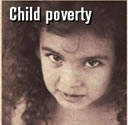However his reign ends, whatever his legacy may be, one moment will always stand out as a monument to Tony Blair. It was that remarkable, utterly unexpected pledge back in 1999 that Labour would abolish child poverty by 2020.
That sunny morning he sprung it on an astounded assembly of economists and poverty experts. The hall rippled with people turning to one another to ask if they had perhaps misheard? Did he really mean it? And if so, did he fully understand how radical it was?
The answer was yes, he meant it, even if he is seized with spasmodic regret. It is one of his more admirable traits to nail himself to targets that matter, and work out afterwards how to do things that seem near impossible. (Abolishing hospital waiting lists by next year is another example.) But his poverty promise is by far the toughest social pledge any British politician has ever made, harder even than the founding of the NHS. And yes, he probably well understood the Herculean scale of the task.
Certainly the chancellor did and he has pursued it as a highest priority, through thick and thin. It has needed his fierce protection from ministers, and sometimes from his neighbour, clamouring to spend money on more popular vote-winners: the poor don't vote, they show no gratitude and the well-off don't know or don't care. The first quarter-way target was missed as 700,000, and not a million children, were lifted out of poverty. Instead of celebrating success, the headlines called it "failure", so why stick to an impossible target?
Because this is emblematic, the unshakable moral underpinning of this government (which Labour defectors would do well to remember). It stands as a constant rebuke to the Tories that they doubled child poverty during their 18 years, leaving appalling social wreckage. It is such an effective moral back-stop that David Cameron has been obliged to sign up to it too. That is how seismic New Labour's effect has been on the political landscape, marking 1997 as just as decisive a shift in political geography as 1979 or even 1945. Those who say there's no difference should look at how the Tories are being hauled from the blue to the red side, with poverty a prime marker in the ideological tug of war.
Read the full article >>

